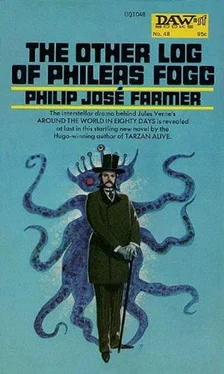Philip Farmer - The Other Log of Phileas Fogg
Здесь есть возможность читать онлайн «Philip Farmer - The Other Log of Phileas Fogg» весь текст электронной книги совершенно бесплатно (целиком полную версию без сокращений). В некоторых случаях можно слушать аудио, скачать через торрент в формате fb2 и присутствует краткое содержание. Жанр: Фантастика и фэнтези, на английском языке. Описание произведения, (предисловие) а так же отзывы посетителей доступны на портале библиотеки ЛибКат.
- Название:The Other Log of Phileas Fogg
- Автор:
- Жанр:
- Год:неизвестен
- ISBN:нет данных
- Рейтинг книги:3 / 5. Голосов: 1
-
Избранное:Добавить в избранное
- Отзывы:
-
Ваша оценка:
- 60
- 1
- 2
- 3
- 4
- 5
The Other Log of Phileas Fogg: краткое содержание, описание и аннотация
Предлагаем к чтению аннотацию, описание, краткое содержание или предисловие (зависит от того, что написал сам автор книги «The Other Log of Phileas Fogg»). Если вы не нашли необходимую информацию о книге — напишите в комментариях, мы постараемся отыскать её.
The Other Log of Phileas Fogg — читать онлайн бесплатно полную книгу (весь текст) целиком
Ниже представлен текст книги, разбитый по страницам. Система сохранения места последней прочитанной страницы, позволяет с удобством читать онлайн бесплатно книгу «The Other Log of Phileas Fogg», без необходимости каждый раз заново искать на чём Вы остановились. Поставьте закладку, и сможете в любой момент перейти на страницу, на которой закончили чтение.
Интервал:
Закладка:
Fix knew this. He also knew that if they were all just what they pretended to be, Fogg would have treated him as generously. He did not like knowing this. It made Fogg too likable.
Verne says that Passepartout, on meeting his master in Japan, did not inform him that Fix was a detective who intended to arrest Fogg. This was not true. Even if Verne’s surface tale was valid, it would be difficult to account for Passepartout’s silence. Verne had him say nothing because it was necessary for his plot. Fogg must be kept in ignorance of Fix’s mission. Otherwise, Fogg would have rid himself of Fix and so not have been arrested when he landed in England.
13
The ship which Fogg took for San Francisco was the General Grant. This belonged to the Pacific Mail Steamship Company and was a paddle wheel steamer also fitted with three masts bearing large sails. At an expected speed of twelve miles an hour, it would cross the Pacific in twenty-one days. Fogg calculated that he would disembark at San Francisco on the second of December. From there he would travel by train to New York City, arriving on the eleventh of December. From New York he would take a ship to England. The twentieth of December would see him in London, ahead of the required arrival date of the twenty-first.
Verne says that, nine days after leaving Yokohama, on the twenty-third of November, the ship crossed the 180th meridian. Fogg had gone exactly halfway around the Earth since this imaginary line was at the antipodes of London. Though Fogg had only twenty-eight days to traverse the second half of his journey, he had actually completed two-thirds of his circuit. To get to the 180th meridian, he had been forced to make long detours. But the course from then on would he comparatively straight.
On this twenty-third of November, according to Verne, Passepartout made a happy discovery. His watch, which he had not adjusted to the various time zones, now agreed with the sun.
Passepartout, Verne says, did not know that if the face of his watch had been divided into twenty-four hours (like Italian watches), the hands of his watch would have indicated the true chronometry. They would have shown him that it was not nine in the morning but nine in the evening. That is, they would indicate the twenty-first hour after midnight, exactly the difference between London time and that of the 180th meridian.
As we know, Fogg had no watches, having expended them in Bundelcund. Verne did not know of the incident at the rajah’s palace, but he also says nothing at this time of Fogg having a watch. Why this gentleman, who conducted himself strictly by the chronometer, lacked a timepiece, Verne does not say.
Fix had stayed in his cabin until the twenty-third, when he felt that he must leave it or go mad. While walking on the forward deck, he ran into Passepartout. He also ran into blows of the fist from the seemingly enraged valet. Passepartout was genuinely angry at the trick that Fix had played on him. But even if he had not been, he would have pretended to be. The role he was playing demanded it. Besides, if Fix were a Capellean, it was fun to pummel him.
Fix tried to defend himself but soon found that the Frenchman was the superior boxer. Lying on the deck, he said, “Are you finished?”
“Yes-for this time,” Passepartout said.
“Then let me have a word with you.”
“But I…”
“In your master’s interest.”
They sat down in an area distant from the other passengers, who had regarded the encounter with enthusiasm, some even making bets.
“You’ve thrashed me,” Fix said. “Good. I expected it. Now listen. Until now I’ve been Mr. Fogg’s adversary. But I’m now in this with him.”
“Aha! You’re convinced he’s an honest man!”
What the devil is this one up to now? he was thinking.
“No,” Fix said coldly. “I think he’s a rascal.”
He proceeded to tell Passepartout his plan, which was to help Fogg win his bet. He would, however, only be doing this so he could get him back on English soil. There it would be determined whether or not Fogg was innocent.
“Are we friends now?” Fix said.
“No,” Passepartout said. “Allies-perhaps. At the least sign of treachery, I’ll twist your neck.”
Passepartout had a double meaning in his threat, of course.
Verne then says that, eleven days later, on the third of December, the ship entered the bay of the Golden Gate. Mr. Fogg had not gained or lost a day.
This is true, but Verne did not know what happened the next few days after Fix was knocked to the deck.
While we do not know exactly what Fix and the gray-eyed man were up to during the time they were out of Passepartout’s and Fogg’s sight, we can reconstruct their activities from Fogg’s other log.
At one in the morning, Passepartout was wakened from a fretful somnolence by the ringing sounds from the watch at his ear. He listened for a moment, ascertaining that the series of sounds formed no code he recognized. He hastily put on some clothes and left the cabin. He did not observe the figure standing in the shadow of one of the large lifeboats on davits some fifty feet away.
He was standing watch because Fix was in bed with diarrhea and a high fever. Nemo was not pleased with this course of events, both because it was inconvenient and because it showed him that Nature was even stronger than he. And since he did not care to be seen by any of Fogg’s party, he could not leave the cabin when the sun was up. He did have a disguise available. The beard was actually a false one, which he could discard in favor of a false moustache. A wig would give him the appearance of a man approaching old age, and putty would make his nose bulbous. To remove the noticeable wide spacing between the eyes, he had a set of glass eyes to which he attached false eyelids and flesh-colored false skin. The glass eyes were thin shells with blue irises, one-way glass which both the Capelleans and Eridaneans had inherited from the Old Ones along with a few other devices far in advance of Earthling science. These could be set within the hollows of his eyes so that his eyes seemed to be closer together.
Unfortunately, half of the vision of each eye was obstructed. Nemo did not like to use them unless the situation absolutely demanded that he do so. He had elected to stay in his quarters, coming out only at night. Now he was just about to light a cheroot when he saw the Frenchman’s cabin door. If it had opened a few seconds later, Passepartout would have seen the light of his match. Cursing (his way of delivering thanks for having been saved from observation), he replaced the cheroot in its case. From his belt he drew a Colt revolver.
He had hoped he would not have to use it, since the noise might alarm the occupants of cabins near Fogg’s. He waited hidden in the shadow of the lifeboat until Passepartout had knocked on Fogg’s door and been admitted. He started toward Fogg’s cabin but had to dodge back under the lifeboat. The door had swung open again. Passepartout emerged and went to Aouda’s cabin, next to Fogg’s, and knocked. There was an exchange of words, which Nemo could not hear, through the crack by the slightly opened door. Nemo supposed that Aouda was requiring Passepartout to give a password, even though she must recognize his voice. In less than two minutes, Aouda came out dressed in a robe, her black hair hanging to her waistline. Both disappeared into Fogg’s cabin.
Nemo walked softly to the door and applied to it a stethoscopic device, another inheritance from the Old Ones. The moonlight falling on his features, showed his alarm, followed by a look of determination. Though he hated to make the noise, there was only one way to enter the cabin. He lifted his right boot and gave the lock a mighty kick. Few locks could have stood up under a kick from Nemo, who was extremely powerful. The lock tore out, and the door banged into the wall with Nemo swiftly leaping through the doorway.
Читать дальшеИнтервал:
Закладка:
Похожие книги на «The Other Log of Phileas Fogg»
Представляем Вашему вниманию похожие книги на «The Other Log of Phileas Fogg» списком для выбора. Мы отобрали схожую по названию и смыслу литературу в надежде предоставить читателям больше вариантов отыскать новые, интересные, ещё непрочитанные произведения.
Обсуждение, отзывы о книге «The Other Log of Phileas Fogg» и просто собственные мнения читателей. Оставьте ваши комментарии, напишите, что Вы думаете о произведении, его смысле или главных героях. Укажите что конкретно понравилось, а что нет, и почему Вы так считаете.












